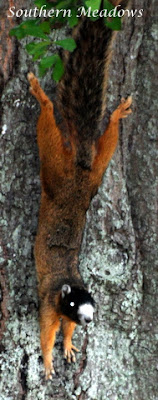Wildflower Wednesday: Zizia aurea
Golden Alexander (Zizia aurea), a native forb in the carrot family, supports numerous pollinators with its bright yellow umbels. These flowers typically bloom in the spring but ours often bloom in mid-winter, which is why I picked it for the first Wildflower Wednesday post of 2021.
Several years ago I planted one Zizia aurea in the garden bed along our front walk. This south facing planting bed is a challenge; in summer the sun is intense yet in winter the ambient heat from the bricks on the house creates a microclimate. Plants in this space need to be tough and tolerant of a variety of weather conditions. Zizia aurea has performed extremely well here, reseeding and creating a nice mass.
This native perennial grows well in clay soils and thrives in moister situations, but will tolerate a wide variety of conditions, even drought. I like this low maintenance plant for our rain garden bed and along the front walk where it can take the summer heat.
 |
| The USDA native plant database map shows a wide range for Zizia aurea, growing from Canada to Florida and over to Texas. |
This carefree plant blooms prolifically in spring. Each flower has 5 sepals, 5 petals and 5 stamens. This low growing perennial puts on a fabulous show with its golden umbels. It would look great paired with Baptisia australis, Aquilegia, or Camassia,
After flowering, seed capsules ripen slowly and can be harvested after the green capsules turn from burgundy to brown. Seeds need moist, cold stratification, which lends itself to winter sowing. The seeds have a high germination rate so I often let them reseed in the garden and transplant seedlings to other parts of the garden or gift to friends.
This is a very versatile plant that can be grown in meadows, wetland areas, and open woodlands. Many pollinators enjoy the golden blooms but the flowers can self pollinate. It's flowers support butterflies, bees, pollinating flies, and beetles. If you live in its growing range I hope you find a place in your garden for this fabulous forb.




.png)
